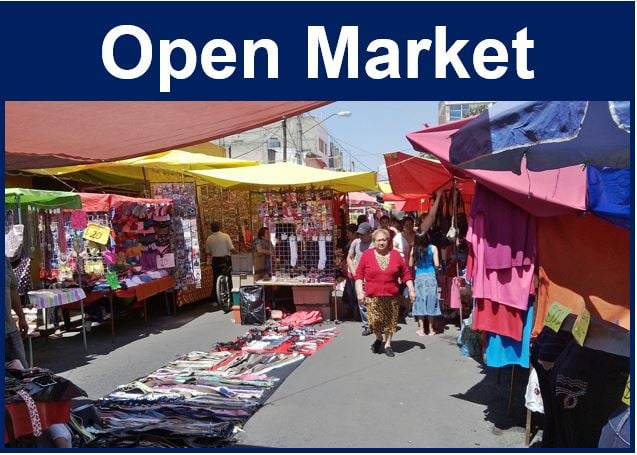An Open Market is a free market in which buyers and sellers can do business without barriers such as tariffs, unfair licensing requirements, subsidies, arbitrary taxes, unionization and other regulations that favor some businesses and people and hinder others.
An open market may have competitive barriers to entry, i.e. the major players have a strong presence, making it harder for new companies to penetrate the market. However, there are not any regulatory barriers to entry.
The advent of digital platforms and the internet has lowered entry barriers in many sectors, enabling even small players to participate effectively in the global market.
A closed market
An open market is the opposite of a closed market. The United States, Canada, Western Europe and Australasia are seen as relatively open markets, while Cuba and North Korea are relatively closed markets.
 The open markets of the East Asia and Pacific Region have helped turn many nations, such as Hong Kong, Singapore, Taiwan, and South Korea into prosperous, advanced economies. (Data Source: OECD)
The open markets of the East Asia and Pacific Region have helped turn many nations, such as Hong Kong, Singapore, Taiwan, and South Korea into prosperous, advanced economies. (Data Source: OECD)
Fully open markets don’t exist
No completely open market exists in the world today. Every economy has laws, regulators, the protection of intellectual property, and requirements regarding honesty, standard of service, or quality of products.
Pharmacies in the advanced economies and many others are not allowed to sell certain medications without a doctor’s prescription. Car manufacturers need to make sure their vehicles comply with countries’ safety regulations.
Companies are not allowed to make untrue claims in their advertising. For example, a business that sells herbs cannot say that one of its products fixes a broken leg or makes blind people see.
 ‘Open market’ also refers to a street market.
‘Open market’ also refers to a street market.
Open vs. protectionist markets
The term ‘open market’ is generally used when describing a market that is accessible to all economic players, in contrast with a protectionist market.
In the advanced economies (rich nations), most companies from abroad can open up and sell within their borders.
In many Middle Eastern economies, foreigners can only compete locally if their business has a ‘sponsor’, i.e. a national who owns a specified percentage of the business. Hence, those Middle Eastern nations are not seen as relatively open markets.
In the UK, several foreign companies compete in the generation and supply of electricity. In Mexico, the whole sector is controlled by the Federal Electricity Commission (Comisión Federal de Electricidad or CFE). Therefore one can say that in the generation and distribution of electricity, the UK has an open market while Mexico has a closed one.
Open markets fare better than closed ones
According to the OECD (Organization for Economic Co-operation and Development), open markets enjoy stronger economic growth, higher productivity, a superior standard of living, more innovations, and stronger institutions and infrastructure than closed markets.
The open market nations of East Asia and the Pacific have seen unprecedented levels of economic growth over the past three decades, and impressive poverty reduction.
World Bank data showed that in 1981, about 93% of the people in these East Asian & Pacific economies lived on less than $2 per day. After opening up their markets, the proportion dropped to 38% by 2005.
The term ‘open market’ may also refer to an investor who sells or buys shares in a company through the stock market, rather than in agreement with the corporation involved.
An open market operation (OMO) is an activity by a central bank, such as the US Federal Reserve System or the Bank of England, to buy or sell government bonds on the open market.
EU Open Market
The European Union (EU) says that free trade can only exist when businesses can actually access their markets. The European trading bloc aims to make sure that access to markets is facilitated for all.
To this end, the EU has implemented measures such as the Single Market Program, which strives to remove trade barriers and allow for the free movement of goods, services, capital, and labor across member states.
